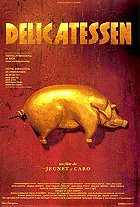Rebellion has a lot in common with the earlier Kobayashi masterpiece Harakiri (Seppuku). Both are among of the greatest samurai films and both are epic, not in a traditional sense of huge battles, but in moral and serious thoughtprovoking aspects.
The story of this film is seemingly simple. Elder son of Sasahara household reluctantly marries the former mistress of the feudal lord on his request. This surprisingly turns into a good and rewarding marriage. Later the newlywed wife is kidnapped back by the feudal lord, and the husband and his father, master of the household (Mifune) have to decide whether to accept it or risk it all by objecting the authorities.
As with Harakiri, Kobayashi patiently builds the atmosphere and gets his viewer feeling related to the main characters. Storytelling might even seem slow with the first hour, but as Harakiri, this film just grows and grows and in the end left me stunned and breathless in admiration. I can also admit that I cried and still seem get moved writing this review the next day. While Harakiri is a study of samurai hypocrisy told brilliantly with a slowly opening plot, Rebellion is a study on the morals and cruelty of authorities. From these main themes opens a lot more: family relations, love and marriage, stubborness, honour...
I could praise still film much more, but I just say: See it for yourself. Essential viewing.
All reviews -
Movies (3)
True samurai classic and a lot more
 Posted : 17 years, 5 months ago on 29 September 2008 02:01
(A review of Samurai Rebellion)
Posted : 17 years, 5 months ago on 29 September 2008 02:01
(A review of Samurai Rebellion) 0 comments, Reply to this entry
0 comments, Reply to this entry
Experiment going unpredictable and extreme.
 Posted : 17 years, 5 months ago on 23 September 2008 05:51
(A review of The Experiment)
Posted : 17 years, 5 months ago on 23 September 2008 05:51
(A review of The Experiment)Would you like to earn some extra cash on a two-week experiment that you could stop at any time? Some would, like these 20 characters in this film. 2 weeks in prison, some assuming the role of guards and some of prisoners. Guards are given the liberty to arrange things pretty much the way they want, with only one major rule: no violence allowed.
Director Hirschbiegel uses slightly artistic surreal style very well, although he had done only tv work before this first feature film. The story itself goes pretty slow in the first hour of the movie, thought it accelerates according to circumstances. The more extreme they get, the faster will the pace go as well. The last half an hour of the film is pure, breathtaking gold.
This film is one great study of both ethics and on psychology about how a bunch of individuals will react in circumstances going both unpredictable and extreme in an accelerating pace. The viewer gets drawn to witness this happening and to do some serious thinking both during the film and after.
Das Experiment is quite uneasy and disturbing to watch but it sure delivers what it wants to, easy or not.
Director Hirschbiegel uses slightly artistic surreal style very well, although he had done only tv work before this first feature film. The story itself goes pretty slow in the first hour of the movie, thought it accelerates according to circumstances. The more extreme they get, the faster will the pace go as well. The last half an hour of the film is pure, breathtaking gold.
This film is one great study of both ethics and on psychology about how a bunch of individuals will react in circumstances going both unpredictable and extreme in an accelerating pace. The viewer gets drawn to witness this happening and to do some serious thinking both during the film and after.
Das Experiment is quite uneasy and disturbing to watch but it sure delivers what it wants to, easy or not.
 0 comments, Reply to this entry
0 comments, Reply to this entry
Essential viewing in post-apocalyptic tradition
 Posted : 17 years, 5 months ago on 21 September 2008 04:47
(A review of Delicatessen)
Posted : 17 years, 5 months ago on 21 September 2008 04:47
(A review of Delicatessen)Amazing first feature film by Jeunet, Delicatessen joins the tradition of post-apocalyptic genre. As in Luc Besson's Le Dernier Combat (1983), we just see a world gone wrong with no explaining why and how. I assume this film takes place somewhere in France in the near future, but it really doesn't matter. Even more, Delicatessen joins Terry Gilliam's Brazil (1985) in both visual style and atmosphere. We see a bunch of weird people in a weird place and don't know much about who they are and what they do and why.
Delicatessen mixes freak show characters and lots of different genres and does it very well. This movie is weird but also highly enjoyable and thought-provoking, in some aspects also disturbing. The most important thing is that Delicatessen is visually one of the most beautiful (in its own weird way) and stunning films you will ever see.
Delicatessen is a post-apocalyptic classic, one of the top among all 1990s films, and thus: essential viewing.
Delicatessen mixes freak show characters and lots of different genres and does it very well. This movie is weird but also highly enjoyable and thought-provoking, in some aspects also disturbing. The most important thing is that Delicatessen is visually one of the most beautiful (in its own weird way) and stunning films you will ever see.
Delicatessen is a post-apocalyptic classic, one of the top among all 1990s films, and thus: essential viewing.
 0 comments, Reply to this entry
0 comments, Reply to this entry
 Login
Login
 Home
Home 6 Lists
6 Lists 3 Reviews
3 Reviews Collections
Collections